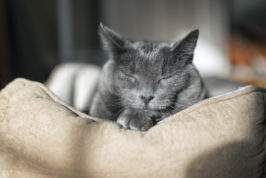Does stress cause Cystitis in cats?
Cats are creatures of habit. They like their routines and can become stressed remarkably easily. Cats also tend to be very good at hiding things, so a stressed cat can be hard to spot. Stress in cats is not only detrimental to their wellbeing, it can have physical manifestations, too. One of these is Cystitis (inflammation of the bladder).
Luckily, there are measures owners can use to help relieve their cat’s stress, or to help prevent it. Dr Sarah-Jane Molier explores the issue for Pet Active Life…
What causes stress in cats?
Cats can become stressed by any changes in their environment. Here are some of the most common causes of stress in cats:
- Multi-cat households, especially if cats are sharing resources
- A new neighbourhood cat, or conflicts over territory
- A neighbourhood cat entering their home
- Changes within the home, such as a new baby, pet or visitors. Even changing furniture can contribute to stress in cats
- Moving house
- Building works within the home
- Changes to their daily routine, such as different feeding times or owners leaving the home for unusual periods of time
- Car journeys, cattery stays or vet visits
- Boredom
- Fireworks
Some of these are inevitable in life, so it’s really important not to feel guilty or blame yourself if you realise your cat is stressed. However, it’s also important to address the issue, and to try to remove or minimise the trigger. Unfortunately, often the trigger isn’t obvious. If you aren’t sure, it’s a good idea to seek advice from your vet.

What are the signs of stress in cats?
The signs of stress in cats are often very subtle. Just as with symptoms of disease, cats tend to mask the signs very well. This means we need to be very aware of what ‘normal’ behaviour looks like for our own cats. Symptoms of stress include:
- Changes in behaviour, such as hiding away or showing unusual affection or aggression
- Changes in appetite
- Sleeping more or restlessness
- Being easily startled
- Urine spraying
- Over-grooming, which may cause hair loss
- An unkempt coat due to lack of grooming
- Licking bedding, carpets or other materials
- Urinating or defecating in inappropriate places
- Changes in body language
- Cystitis symptoms, such as straining to urinate (dysuria) or blood-tinged urine (haematuria)
It is important to note that all of these symptoms can also occur due to illness or pain. It is really important to have your cat checked by a vet if you notice any of these signs, or any unusual behaviour.
What is Feline Idiopathic Cystitis (FIC)?
Idiopathic Cystitis is inflammation of the bladder with unknown cause. Around two-thirds of cats with issues relating to the bladder or urethra (the tube that passes urine out of the body, from the bladder) will have FIC.
FIC is diagnosed when all other possible causes of Cystitis have been ruled out. Although the exact cause of FIC is unknown, stress is thought to be one of the main contributing factors. Cats with FIC may also have an abnormal physical response to stress. You can read more about FIC here.
What can I do to help my cat’s stress levels?

Once cats develop FIC, they will be prone to Cystitis symptoms for life, and are likely to have flare-ups around stressful periods. This means that stress reduction plays a major role in the treatment and control of this condition. Ideally, any specific causes of stress should be identified, and either removed or minimised. Other stress-reduction strategies include:
- Trying to keep to a routine, such as consistent mealtimes
- Avoiding boredom by playing games with your cat and using toys such as puzzle feeders, to keep them mentally stimulated
- Offer choices of comfy beds – ideally at least one on each floor
- Provide plenty of hiding places: igloo beds, makeshift cardboard box dens or elevated beds all work well
- Keep food bowls, water stations and litter trays apart from each other
- Avoid stress or conflicts over resources. You should provide one litter tray, food bowl, water bowl and bed per cat, plus one spare
- Cat flaps are useful for outdoor cats so they can come in and out as they please
- It’s a good idea to allow indoor cats some outdoor access – either using a cat harness or specialist cat run. Alternatively, provide plenty of indoor activities
- Avoid unwanted feline visitors by using a microchip-specific cat flap
- Pheromone plug-ins and sprays may help to reduce stress
- Calming supplements can be very effective in some cats. There are several available, based on ingredients like L-tryptophan, which the body converts to ‘the happy chemical’, serotonin
- For cats prone to FIC, urinary relief supplements can help to prevent flare ups and support a healthy bladder
Conclusion
Stress can be detrimental to a cat’s emotional and physical health, and is more common than we would like to believe. Feline Idiopathic Cystitis is one important and common example of a physical manifestation of stress in cats. Luckily there are lots of strategies we can use to help minimise this stress. Educating ourselves on our cats’ natural behaviours and preferences will go a long way to helping our feline friends lead a calm and stress-free life.




